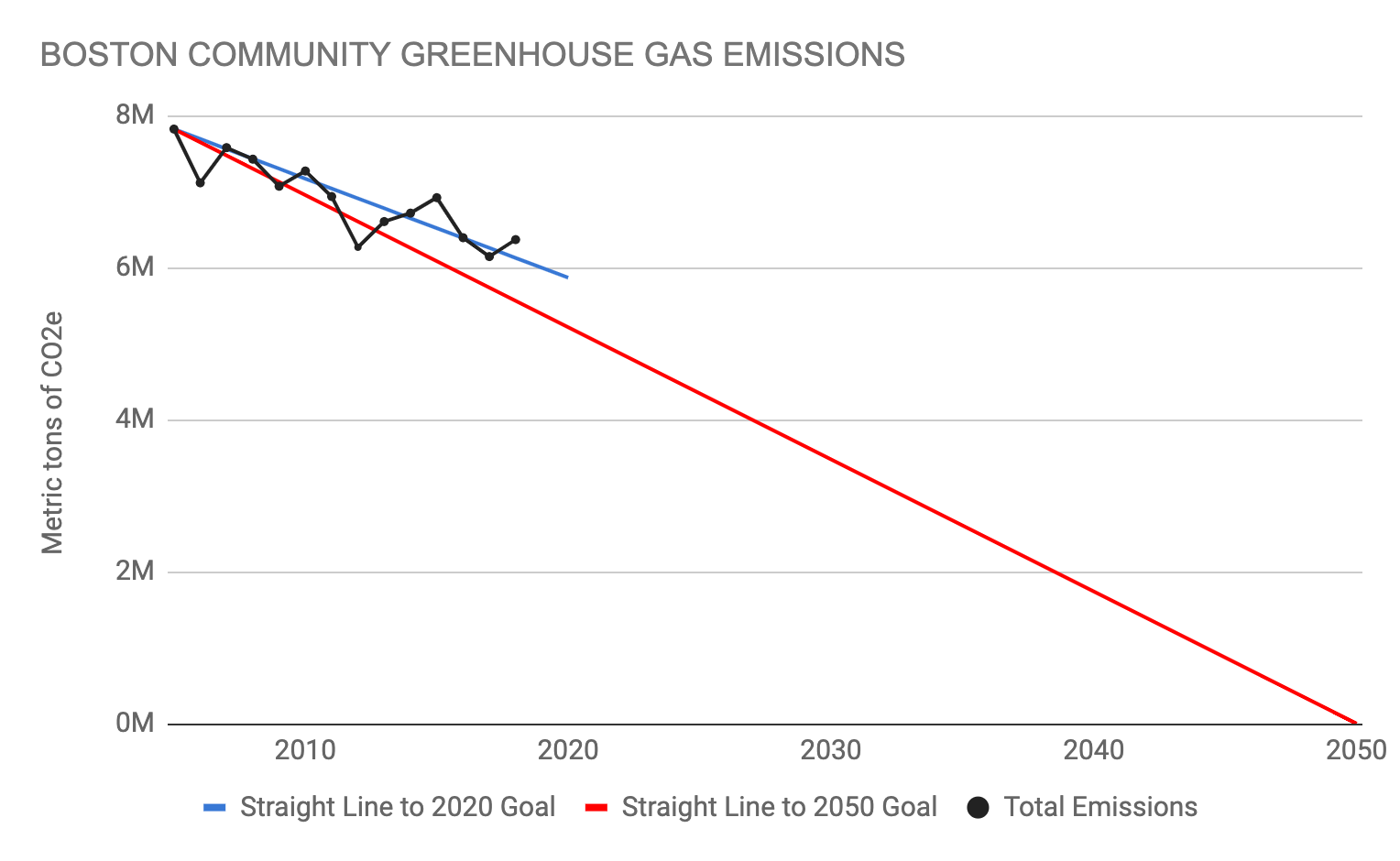Reducing emissions
Carbon Free Boston is our initiative to become carbon neutral by 2050 by significantly reducing greenhouse gas emissions that contribute to climate change.
Global warming is causing our climate to change. Recent climate reports show we're heading towards extreme climate changes unless we can act now. We have pledged to make Boston a carbon-neutral city by 2050. This means that in 30 years, our community can only release as much carbon pollution as our environment can safely absorb.
2019 Climate Action Plan
The 2019 update lays out the climate strategies we will accelerate over the next five years. We want to increase carbon emissions reduction in Boston’s buildings and transportation.
You can also view an interactive summary in English or the following languages:
- Español (Spanish)
- 繁體中文 (Traditional Chinese)
- Kreyòl ayisyen (Haitian Creole)
- Tiếng Việt (Vietnamese)
- Português (Brazilian Portuguese)
Please contact our office to request additional languages.
The City has set a goal of making Boston carbon neutral by 2050. Buildings and transportation make up nearly 99 percent of Boston’s carbon emissions. We are putting in place strategies to cut emissions from both these areas:
- Buildings: We're transitioning to zero-net carbon new construction. We plan to develop carbon targets to improve existing buildings over time.
- Transportation: We're putting in place Go Boston 2030 and supporting the adoption of zero-emission vehicles.
We will also take steps to make our energy supply cleaner and more resilient. We plan to reduce the environmental impact of consumption by Bostonians.
implementation
The City is carrying out the strategies laid out in the 2019 Climate Action Plan Update. We will provide regular updates on our progress in carrying out our climate plans. Learn more about the current status of strategies and progress towards our goals:
Programs
Building Energy Reporting and Disclosure Ordinance
Boston's large- and medium-sized buildings must report their annual energy and water use.
Renew Boston Trust
We're pursuing energy efficiency and resiliency in our building portfolios by using a proven self-funding financing model.
Community Choice Energy
We're giving Boston residents greater control over the kind of energy they use in their homes, and the price of that energy.
Air Pollution Control Commission
The Boston Air Pollution Control Commission works to maintain healthy air quality and noise levels in the city.
Zero Net Carbon Building Zoning Initiative
The Boston Planning & Development Agency (BPDA) is strengthening green building zoning requirements to a zero net carbon standard for new construction.
Recharge Boston
Recharge Boston is Boston Transportation Department's initiative to transition Boston to zero-emission vehicles with outreach and guidance.
Carbon Neutrality
Recent climate reports show we’re heading towards more extreme climate change than previously thought. This includes rising sea levels and severe storms and temperatures.
In the face of this challenge, Boston is taking action to stop our contribution to climate change. Between 2005 and 2016, we reduced the amount of carbon pollution we emit each year by 18 percent. Learn more about our emissions.
We have a vision for reducing our emissions to fight climate change. We have pledged to make Boston a carbon-neutral city by 2050. Carbon neutrality means that in 30 years, our community can only release as much carbon pollution as our environment can safely absorb.
Progress
In 2018, the Boston community emitted 6.4 million metric tons of greenhouse gases (GHGs). Emissions came from energy use:
- in buildings and other facilities, and
- from transportation.
This is an almost 4 percent increase from 2017. Overall, Boston’s 2017 emissions represent a 20 percent decrease from 2005. This reduction has occurred at the same time that the population and the number of jobs in Boston have increased. The decrease is in large part due to a cleaner electric grid and buildings switching from fuel oil to natural gas.
The City of Boston has set GHG reduction goals of 25 percent below 2005 levels by 2020 and carbon neutrality by 2050.
Read through the inventory report and methodology.
On December 11, 2019, former Mayor Martin J. Walsh signed an executive order for carbon-neutral City buildings. Setting a Zero Net Carbon standard for new municipal buildings is a strategy from the 2019 Climate Action Plan Update. New City buildings will be highly energy efficient. They will also promote clean energy and fossil fuel free systems.
DEVELOPING CARBON TARGETS FOR EXISTING LARGE BUILDINGS
The City of Boston is developing a new policy to make existing large buildings healthy and climate-friendly. Large buildings in Boston are the biggest emitters of carbon pollution. Developing a carbon standard for these buildings is one of the 2019 Climate Action Plan Update strategies. We are launching a process for the community to help inform policy design.
News
NewsGo Boston 2030
Go Boston 2030 is the City's bold vision for our transportation future. This plan will help the City of Boston meet our emissions reduction goals.
Learn about Go Boston 2030Resources
Resources- Buildings Technical Report
- Policy Appendix (Excel)
- Buildings Model Assumptions (Link to Google Drive folder)
- Transportation Technical Report
- Policy Appendix (Excel)
- Waste Technical Report
- Policy Appendix (Excel)
- Energy Technical Report
- Offsets Technical Report
- Guide for Zero Emission Buildings, Department of Neighborhood Development (2020)
- Zero Net Carbon Building Zoning Initiative, Boston Planning and Development Agency




